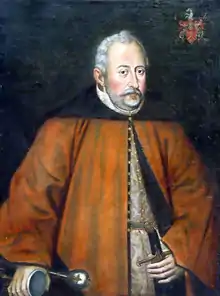Siege of Kraków (1587)
The 1587 siege of Kraków took place between 14 October and 29 November 1587, after the contested 1587 Polish–Lithuanian royal election, which resulted in a double selection of opposing candidates - Zygmunt Waza was elected by the nobility on the 19th of August, while another faction of the gentry chose Maximilian III, Archduke of Austria, on the 22nd of August. Maximillian attempted to enforce his election by force, leading to the War of the Polish Succession (1587-1588), and in the course of the campaign besieged the city of Kraków.

Kraków was defended by the hetman Jan Zamoyski, and a general attack by the pro-Austrian forces was repelled on 22 November. Many affluent burghers of German background participated directly in the defense against "the German enemies", while others donated funds for the city's defense. Several of them were ennobled as a result and admitted into the ranks of the szlachta.[1]
References
- Friedrich, Karin (1999). "Cives Patriae: 'German' Burghers in the Polish-Lithuanian Commonwealth". In Roger Bartlett; Karen Schönwälder (eds.). The German lands and eastern Europe. Essays on the history of their social, cultural, and political relations. St. Martin's Press. pp. 55–56. ISBN 0-333-72086-5.